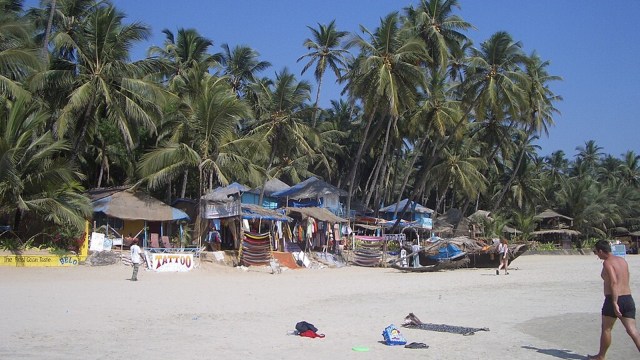
By Nandini Tank
A Goa trip with friends is a pilgrimage for friendship, at least I would say so. Like many, I had often been part of those plans. However, unlike most, I ended up coming alone and unexpectedly landed a job here.
On the surface, moving to Goa sounds idyllic. The images that come to mind are easy: Golden beaches, sunset parties, cheap booze, and a carefree lifestyle that seems to sell itself. I was excited and hopeful, believing I was stepping into a life most people only dream about. But the illusion didn’t last long. January brought with it a new year and new opportunities, but instead of feeling energised, I felt completely out of place, a stranger in a city that never seemed to slow down.
The first two months were especially hard. Simple things like finding a place to live, locating a grocery store, navigating the roads became overwhelming tasks. I reached out to friends, asking if they knew anyone here, hoping for even the smallest thread of connection. There was none. During those weeks, I cried often, unravelling in therapy sessions as I tried to explain why I felt so miserable in a place so many consider paradise. I couldn’t quite name it — until my therapist gently did: Unfamiliarity.
Familiarity, a safe space, and a community were what I craved. But how do I meet people in a new city as a single woman? Approaching people in a bar or restaurant seemed “too desperate.”
One Saturday night, after venting to a friend about how lost I felt, she sent me a WhatsApp link: “Communidade Goa.” The group description read, “Need a ride; a non-judgemental doctor; a hidden away food place; key maker; house to rent; a pet sitter; help out, ask for help” with several links of other WhatsApp groups. I joined 10 WhatsApp groups that night (still desperate but anonymous). The next Monday, when my favourite pair of jeans tore, I posted in the group asking where I could get them darned. Someone dropped a pin for an old tailor in Mapusa market. Months later, I am still wearing those jeans — and still thinking about that tiny act of help. Next Friday, when I asked the group members to “tag me” for any upcoming activities, a stranger sent me a link to a “Potluck Goa” WhatsApp group that organises monthly Sunday dinners; everyone brings food based on that month’s theme. What better than creating new connections over a variety of home-cooked meals!
Another WhatsApp group, “The Circle Goa,” dedicated to women, trans-women, and non-binary individuals, became an unexpected lifeline. I nervously shared my PCOS diagnosis and asked for recommendations for a non-judgemental gynaecologist in town. What followed stunned me. Dozens of responses poured in. Public messages and private chats — filled with support, empathy, and shared experiences. One woman offered free yoga classes. Another asked if I’d like to join her for evening walks. I felt safe and visible.
I also joined another group named “Board Games Goa.” That one was a surprise. Growing up in Ranchi, I only played outdoors, climbing trees, football in a muddy maidan: Spontaneous and unscheduled. Still curious, I walked to “NomadGao” on a Sunday afternoon to play board games, not knowing what to expect. What was supposed to be a two-hour visit turned into six. The community taught me how to play each game, explained the rules with patience, and made space at their table like I had always belonged. I now go regularly — not just for the games, but for hotpot and community gatherings.
In July, “Silent Book Club” run by Asro Cafe, organised a book hunt at the Museum of Goa, a playful, literary twist on a scavenger hunt. Clues were shared with us in the WhatsApp group chat, each pointing toward an artwork within the museum. We were paired up in teams of two, and I ended up winning not one, but two books, Blueprints by Marcus du Sautoy and Sounds Like Love by Ashley Poston.
In cities that often lack formal support systems for newcomers, especially single women, informal digital communities like WhatsApp groups have emerged as soft infrastructures: Decentralised yet deeply personal, fragile yet powerful. Research reveals that these WhatsApp groups generate a sense of being held in a community through feelings of collective presence and safety. These micro-communities don’t rely on permits or city planning. They rely on empathy, shared interest, and the quiet generosity of strangers.
For single women, these groups can offer more than information; they create a sense of emotional safety. Most cities, even the liveliest ones, aren’t built for single women. Public spaces can be intimidating, activities often seem group-centred, and safety is a persistent concern. But technology has begun to bridge that gap, allowing women to reclaim space and time through collective participation.
What started as a survival tactic in a new city — joining WhatsApp groups to feel less alone — became the foundation of a real, lived community. These online communities, informal as they are, offer a modern blueprint for connection: Fast, flexible, and rooted in care.
In a world where movement is constant and permanence feels rare, single women like me are building new forms of home — one message, one group, one Sunday afternoon at a time. These experiences reminded me that while cities may feel impersonal, digital communities rarely are.
The writer is the founder of Adivasi Geotags and currently works as a Research Associate at the Goa Institute of Management